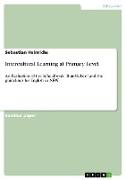Intercultural Learning at Primary Level
BücherAngebote / Angebote:
Seminar paper from the year 2005 in the subject English - Pedagogy, Didactics, Literature Studies, grade: 2, 3, Bielefeld University, 4 entries in the bibliography, language: English, abstract: The discussion about aims, content and methods of foreign language lessons resulted in demands for a broader integration of intercultural learning. Jörg Roche, who dedicated one chapter of his book Interkulturelle Sprachdidaktik: Eine Einführung to the role of intercultural language didactics in the teaching and learning of foreign languages, makes specific suggestions about restructuring the traditional concepts of foreign language lessons. According to him, the best learning success is achieved when intercultural learning and foreign language teaching are integrated. He explains conclusively that language and culture are inseparably bound to one another. Roche also warns not to use isolated or poorly researched pieces of cultural information, since this would lead to a falsified image of the target culture and prevent the learners from authentic language use.
Roche's appeal illustrates the growing need of intercultural communication. Young pupils in Germany do not only live in a country that maintains contact with cultures all over the world, but they are also part of a multicultural society that is mirrored by the school classes. Foreign language lessons offer the opportunity to help them deal with it and prepare them for living in a multicultural society. After the introduction of English as a foreign language as an obligatory school subject in the classes 3 and 4 of the primary schools in 2003, it is now possible for the young learners in Germany to exhaust their enormous language learning potential more effectively. However, how they should be taught, and what exactly, is still discussed extensively.
The new school subject made it necessary to develop a new curriculum and new school books, which were supposed to meet the needs of the young foreign language learners and the conditions of the guidelines. Considering the textbooks Bumblebee 3 and Bumblebee 4 (Schroedel 2003) as examples, this paper examines in how far the school books concur with the regulations concerning intercultural learning. Of course, school books do not solely represent what is taught in the lessons, the way the teachers uses them and what they teach additionally must also be regarded for that. Yet, the books play a central role in the lessons. Tasks, content and especially the illustrations have much influence on how the lessons are perceived by the pupils. Furthermore, the pupils can take the books home where they can work autonomously.
Folgt in ca. 10 Arbeitstagen
